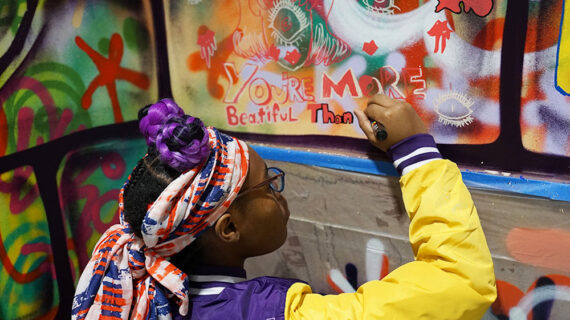
How can you help your kids navigate the mental health crisis? This advice from the Surgeon General can help.
Photo above by Helena Lopes via Unsplash.
When U.S. Surgeon General Dr. Vivek Murthy spoke with the nation’s school leaders recently, he addressed the questions that are keeping America’s parents and teachers awake at night: How do we tackle the mental health crisis that is affecting so many millions of young people? And how can adults help the young people we love when so many of us are struggling ourselves?
Educators made up the audience for this video conversation, which was hosted by AASA, The School Superintendents Association, and the co-authors of “When You Wonder, You’re Learning,” Gregg Behr and Ryan Rydzewski. But Dr. Murthy’s research and insight isn’t just valuable for teachers. It offers a way forward for anyone who is helping raise the next generation of young people.
As his talk began, the Surgeon General spoke about the importance of recognizing the size of the crisis we’re facing. His latest advisory, titled “Parents Under Pressure: The U.S. Surgeon General’s Advisory on the Mental Health & Well-Being of Parents,” is filled with sobering data, including this:
Parents’ stress levels are remarkably high: 41% of parents say that most days they are too stressed to function. At the same time, data shows that children of a primary caregiver who reported poor mental health were four times more likely to have poor general health and two times more likely to have their own mental, behavioral or developmental disorders.
Echoing his 2023 Advisory on Social Media and Youth Mental Health, Dr. Murthy mentioned the association between three-plus hours of social media use per day and a doubling of anxiety and depression among adolescents. Today, he said, the average use of social media among adolescents has reached nearly five hours per day.
But worrisome as those numbers may be, Dr. Murthy said, “if we don’t see it clearly for what it is, then we’re not able to deal with it.”
He also offered reassurance: “There’s a lot that we can do,” the Surgeon General told AASA’s audience.
DR. MURTHY’S PRESCRIPTIONS
A key step in helping today’s young people is “expanding our access to mental health care and bringing it closer to where students are,” Dr. Murthy said. “That means in schools or in their communities or in their homes,” and can even mean offering mental health care via the digital devices that many students use.
“But the other half of it has to involve prevention — looking at what the root causes are that are driving the broader youth mental health crisis, and then thinking about how we address those, whether those are loneliness and isolation, trauma and violence in people’s lives, or the experience of social media.”
Although an individual parent or teacher may be limited in what they can do also, Dr. Murthy pointed out that by working together we can make progress. The adults in a school community can partner to eliminate the use of cell phones in classrooms. This would limit the impact of social media, he said, while also creating “space for students to learn and engage with each other without technology,” which would improve their social bonds.
Parents and teachers can also work together to push for public policy that would require social media companies to share accurate data on the impact of their platforms on young minds. Adults can also talk with kids and teens about their own struggles with social media use, while discussing the science behind social media addiction.
“You’ve got the best product engineers in the world funded by the best resourced companies in the world, using cutting-edge neuroscience to figure out how to maximize how much time we spend on their platforms,” Dr. Murthy said.
Adolescents are at “a critical phase of brain development where they’re more susceptible to social suggestions, social comparison, but also where impulse control has not developed as much.”
One solution would be pushing for policies that ensure kids are not exposed to features like “infinite scroll” and “like” buttons, which are “designed to manipulate their developing brains into excessive use.”
Teachers, parents and other caregivers can also recognize the levels of stress and burnout among one another. By actively building social connections and having compassion for one another and ourselves as we navigate this challenging era, we can better manage our own mental health. That, in turn, allows us to be healthier as we help kids and teens tackle their own challenges.
TACKLING THE CHALLENGE TOGETHER
As his presentation was wrapping up, the Surgeon General was asked by Dr. Ellen Galinsky, author of the books “The Breakthrough Years” and “Mind in the Making,” how we might invite young people to be part of the solution.
“One of the most powerful ways to engage young people is to ask them to help each other,” Dr. Murthy said.
Around the country, “students are brokering dialogue with other students about their experiences on social media,” he said. “They’re creating a space where it’s OK to talk about it without feeling embarrassed, but then they’re also creating the kind of networks where students can take action together.”
Just one benefit: “If students decide, ‘Hey, I want to take a break from using social media and see how I feel,’ there are other students who are doing that with them,” the Surgeon General said. They “can actually compare notes and can help keep each other accountable.”
That accountability and sense of community could be a powerful antidote to the mental health struggles that are impacting Americans of all ages.
“If we work together and learn from each other about how to, for example, manage technology and social media for kids, or how to build social connection,” Dr. Murthy said, “then we’re going to be much, much more successful at addressing the broader mental health crisis.”










